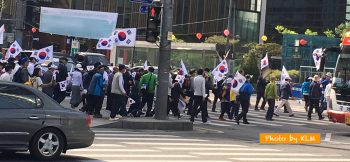What Does “Kwangbokjeol” Mean in Korean Posted by Kyung-Hwa on Aug 1, 2018 in Korean Language
Pretty soon, the streets around the country will be flooded with Korean flags, since one of the important holidays in Korea is around the corner.
What is 광복절[kwang-bok-jeol]?
광복절 is a 국경일 (national holiday) that have celebrated on August 15thof every year. Direct translation of 광복절 means “the light restoration day.” It is the day that Koreans have celebrated restoration of their 정부 (government) and 자유 (freedom) from Japanese occupation in 1945. Not only celebrating restoration of the country, it also celebrates the 설립 (establishment) of the Republic of Korea, South Korean government, in 1948. On the day of 광복절, government organizations, stores, and homes will display 태극기 (Korean flags) outside the buildings, and there will be many 공식행사 (official ceremonies) and 행진 (parades). South Korean government has traditionally pardoned prisoners on 광복절.
An interesting fact about 광복절 is that it is one of the few public holidays both North and South Koreas celebrate.
Historical Background of 광복절 [kwang-bok-jeol]
Korea is a 반도 (peninsula) that is located in East Asia. It had been a strategic location to become a springboard or a blockage that many major powers could advance further by land or sea. Due to its geographical location, for a small country, Korean peninsula had historically faced countless 충돌 (conflicts) and encountered numerous 침략 (invasions) from many neighboring countries such as 중국 (China), 러시아 (Russia), and 일본 (Japan) by land and sea.
Between 1910 and 1945, Korea was under Japanese rule, and it was a dark period for the Korean nation. The 한국어 (Korean language) was suppressed, and Koreans were forced to learn the 일본어 (Japanese language) and use Japanese names as well. Korean men were forced to work in Japanese 공장 (factories), and during the wartime mobilization in 1937-1945, Korean men were enlisted to serve in the Imperial Japanese army while Korean women were drafted to serve as 위안부 (comfort women) for Japanese 군인 (soldiers). Due to these historical backgrounds, you will often see rising tensions between Japan and Korea on the News.
For a small country, Korea had been historically placed in the center of the storm of the major powers due to strategic interests. When you consider Korea’s past history, you will understand why 광복절 is one of the special national holidays in Korea, and why Japan and Korea struggle to overcome their past scars.
감사합니다! (Thank you!)

Build vocabulary, practice pronunciation, and more with Transparent Language Online. Available anytime, anywhere, on any device.




